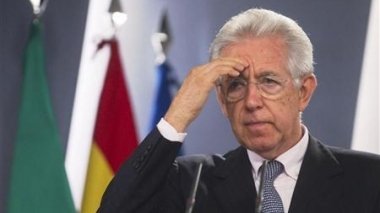
Italian stocks have fallen sharply, reacting to news that Prime Minister Mario Monti plans to resign and former premier Silvio Berlusconi is to run for office again.
The main Italian stock index fell 3.1%.
Other indexes throughout Europe were also lower, with banks the worst hit among shares.
Mario Monti became the leader of a technocrat government in 2011 after investors became worried about Italy’s economic health.
Silvio Berlusconi’s People of Freedom party withdrew its support from the government on Thursday, and Berlusconi confirmed he would lead his party into next year’s elections – now on course to be held slightly earlier than expected.
Mario Monti had planned to serve until April 2013, when the current parliamentary term runs out. He had hoped this would be enough time to “rescue Italy from financial ruin”.
The withdrawal of his political support means that elections are now set for February.
Mario Monti replaced Silvio Berlusconi after the Italian 10-year bond yield reached a euro-era record of 7.48% in November 2011, bringing about Berlusconi’s departure. Since then, Italy’s yields have dropped and the focus has shifted to Spain, which has taken a bailout for its banks, and back to Greece.
However, on Monday, Italy’s 10-year bond yield jumped more 0.3 percentage points to 4.8%.
Among individual shares in Italy, banks were the hardest hit. Italy’s biggest, Unicredit, fell 6%. Banca Monte dei Paschi di Siena fell 7% and Banca Popolare di Milano declined 6.9%.
Across banks in Europe, Germany’s Commerzbank fell 2.9% and France’s BNP Paribas dropped 2.5%. In Spain, banks such as Santander, Bankia and BBVA all turned lower.
“Monti is the one who managed to stabilise Italy and stop the contagion from Greece,” said David Thebault, a trader at Global Equities.
“His surprise resignation brings back the political risk in the equation, something we had forgotten about.”

Italy’s government has the biggest debt burden of any of the major eurozone countries at 123% of economic output (GDP), which makes it particularly susceptible to a loss of market confidence. This is because higher borrowing costs would make it very difficult, if not impossible, for the government to roll over its debts as they come due for payment.
Jane Foley, a currency strategist at Rabobank, said: “The resignation of Italy’s technocrat PM Monti at the weekend has re-awakened fears of a return to old style political theatre in the country and brought some fresh downside pressure for the euro.”
The 17-nation currency fell against the dollar and British pound.
Mario Monti, an economist who heads a unelected cabinet of technocrats, has said he will try to pass a budget and financial stability law before standing down.
A statement from the office of President Giorgio Napolitano over the weekend said that Mario Monti “does not think it possible to continue his mandate and consequently made clear his intention to present his resignation”.
If the law for next year’s budget can be passed “quickly”, Mario Monti would immediately confirm his resignation, the statement said.
An election must come within 70 days of the government resigning. Italy had been due to go to the polls by April at the latest.
Mario Monti – a respected former commissioner at the European Union – has tried to pass reforms, including implementing in July a series of spending cuts of 26 billion euros ($32 billion) over three years to tackle the deficit.
But many of the proposals have been watered down or stalled as they have gone through parliament.
Italy’s economy has been shrinking all year – its fourth recession of the past 10 years.
Employers’ lobby group Confindustria predicts that the economy will shrink 2.4% this year, with unemployment hovering around 11%. The government forecasts the economy will contract by 1.2% this year.
Silvio Berlusconi was convicted of tax fraud in October, though he is appealing against that ruling, and he is also on trial accused of paying for sex with an underage prostitute.
He has already served as Italy’s prime minister for three separate terms and built up what is believed to be a vast personal fortune from his business empire.